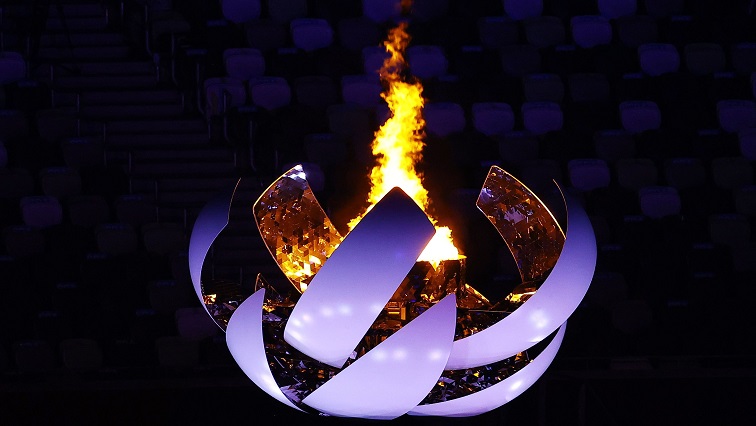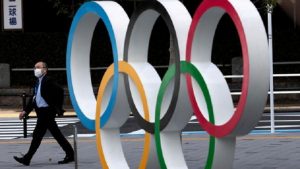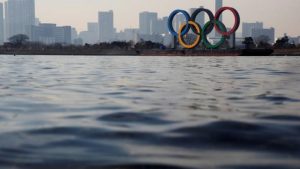Olympic athletes got a surreal glimpse of everyday Tokyo life on Sunday when the closing ceremony was briefly transformed into a park with grass, buskers and BMX riders in a valediction after weeks spent under the regime of a pandemic Games.
Performers danced, skipped and played soccer, mingling and waving to athletes, who gathered closely together on the grass. Organisers said the scene was meant so they could “experience Tokyo”, a poignant nod to the fact that many spent their time at the Games cooped up in rooms or competing in venues.
It was a duly odd closing to a Games that were upended by the pandemic and then transformed by the drama of politics, sport and personal turmoil. The Tokyo Olympics were originally intended to show Japan’s recovery from a devastating earthquake, tsunami and nuclear crisis in 2011.
After being postponed for a year, organisers said the Games would serve as a symbol of the world’s triumph over the pandemic. Held without spectators and with COVID-19 variants resurgent, the Games fell short of triumph and the financial windfall Japan first sought.
Instead, the host nation is saddled with a $15 billion bill, double what it initially expected, and with no tourist boom to offset it.
Tokyo 2020 President Seiko Hashimoto declined to give a final verdict on the Games until the Paralympics, which open on Aug. 24, are over, telling a news conference earlier on Sunday she “couldn’t say at this stage that we have achieved 100% success”.
“If we had spectators, we wouldn’t have been able to provide a sense of safety for the general public,” she said.
Public anger over the pandemic response and a slow-to-start vaccine roll-out have badly damaged Prime Minister Yoshihide Suga’s standing. Public opinion polls showed most Japanese opposed holding the Games during the pandemic.
ODD PAIRING
The Takarazuka Revue, an all-women musical theatre group with a history spanning more than a century, sang the national anthem dressed in colourful traditional hakama.
It seemed an odd pairing for the Games, as the Takarazuka allows only unmarried women to perform and touts “modesty” and “grace” as part of its motto. The Games, by contrast, are said to stress gender equality.
Around a hundred protesters carrying signs that read “Olympics kill the poor” and “We don’t need the Olympics” jostled with police officers outside the stadium, although they were outnumbered by the crowd that lined the streets. Would-be spectators came out in force during the Games, defying authorities and blistering heat to peek in from overpasses as they tried to catch a glimpse of outdoor events such as the triathlon or new sports such as skateboarding.
Organisers appear to have prevented the Games from spiralling into a COVID-19 superspreader event, notable given that some 50 000 people came together amid the pandemic.
In a sign of the measures, winners accepted their prizes from trays, putting the medals around their own necks, although social-distancing protocols preventing hugging, for example, were largely ignored throughout the Games.
While the bubble the set of venues and hotels to which Olympic visitors were largely confined – appeared to hold, elsewhere some things fell apart. Fuelled by the Delta variant of the virus, daily infections spiked to more than 5 000 for the first time in Tokyo, threatening to overwhelm its hospitals.
Japan’s record medal haul also helped to take out some of the sting for organisers. The United States finished top of the tally with 39 gold medals, one more than rivals China at 38 and Japan at 27.
Japan will hand over the Olympic baton to the next host city, Paris, at the ceremony.
“We can already now say with confidence that we have experienced a very successful Olympic Games considering all the uncertainties we had the last two years,” International Olympic Committee (IOC) President Thomas Bach said before the ceremony.
COLD WAR AND ‘TWISTIES’
After a year’s delay and often against the backdrop of cavernous, nearly empty venues, the Games themselves provided plenty of high drama.
That culminated with the defection of Belarusian sprinter Krystsina Tsimanouskaya who, in a moment more reminiscent of the Cold War, refused to board a flight home after she was taken to the airport against her wishes.
She has since sought refugee status in Poland.
US superstar gymnast Simone Biles shocked the world when she pulled out of five of her six events, including abruptly abandoning the women’s team final after attempting just one vault, citing concerns for her mental and physical health.
The 24-year-old spoke with candour about struggling to deal with the weight of expectation placed on her and made the world aware of the “twisties”, a mental block that prevents gymnasts from performing their gravity-defying skills.
Biles ultimately came back to win the bronze on the balance beam in the final event of the women’s gymnastics programme, a moment of triumph that crystallised her transformation from Olympic champion to advocate for mental health.
In athletics, Italy provided a different kind of shock with their amazing run. Their wins included a stunning gold in the men’s sprint relay, taking their athletics gold tally to five.
In swimming, the United States were without 23-time Olympic gold medallist Michael Phelps for the first time since the Atlanta Games in 1996 and, while their gold count slipped, they still ended the meeting on top of the medals table with 30 in total.






